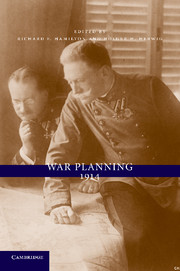Book contents
- Frontmatter
- Contents
- List of Maps
- Contributors
- Acknowledgments
- 1 War Planning: Obvious Needs, Not So Obvious Solutions
- 2 Austria-Hungary
- 3 German War Plans
- 4 War Planning and Initial Operations in the Russian Context
- 5 France
- 6 Great Britain
- 7 Italy
- 8 Conclusions
- Appendix: Suggested Reading
- Index
- References
6 - Great Britain
Published online by Cambridge University Press: 27 January 2010
- Frontmatter
- Contents
- List of Maps
- Contributors
- Acknowledgments
- 1 War Planning: Obvious Needs, Not So Obvious Solutions
- 2 Austria-Hungary
- 3 German War Plans
- 4 War Planning and Initial Operations in the Russian Context
- 5 France
- 6 Great Britain
- 7 Italy
- 8 Conclusions
- Appendix: Suggested Reading
- Index
- References
Summary
It is problematic, and perhaps misleading, to speak of British war plans before 1914. War plans conjure up images of well-oiled machinery automatically and inexorably committing armies to what the historian A.J.P. Taylor has called “war by timetable.” War plans also tend to suggest that a state has worked out provisions to take aggressive action against its foes, is obliged by alliances to take up arms in support of an ally, or, at the very least, has strategies to defend itself against its enemies. Only the last of these applies to Britain before 1914. Britain had no intention of committing aggression against anyone and was not bound by treaties, secret or otherwise, to go to war. Nor were British war plans by any means automatic responses to events. Instead, British prewar plans were contingent upon circumstances, something reflecting its peculiar position in Great Power politics.
Although the decade before 1914 is often characterized as an era when the Triple Entente of Britain, France, and Russia faced the Triple Alliance of Germany, Austria-Hungary, and Italy, this was not the case. Although the Anglo-French entente cordiale of 1904 and the Anglo-Russian Convention of 1907 had improved Britain's relations with its two long-standing foes, and had created in many minds (a substantial number of them German) the impression that there existed a solid bloc opposing the Triple Alliance, there was no substance to this belief. No commitment, “moral” or otherwise, existed that would force Britain to intervene in any continental quarrel.
- Type
- Chapter
- Information
- War Planning 1914 , pp. 175 - 197Publisher: Cambridge University PressPrint publication year: 2009

